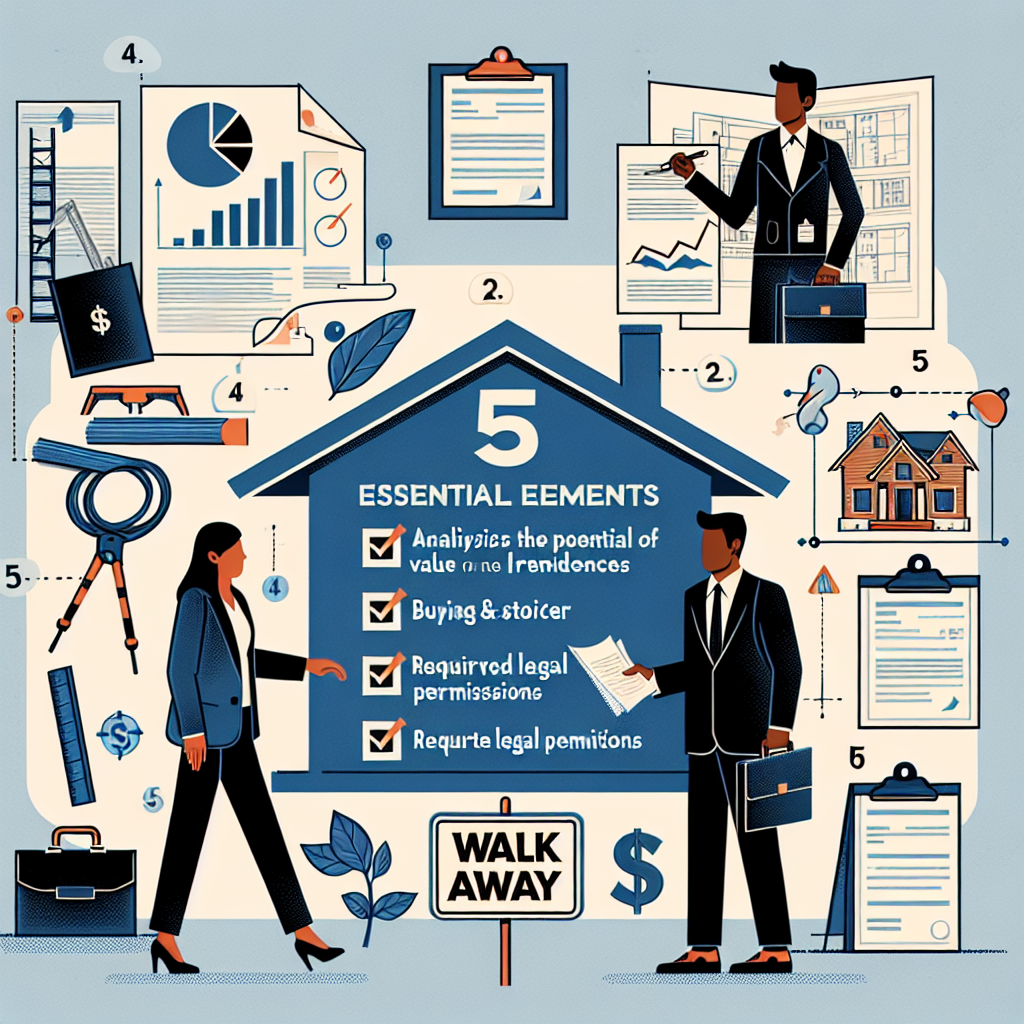-
Table of Contents
- 5 Non-Negotiables for My Flip: Walk Away If They’re Missing
- 1. Location, Location, Location
- Desirable Neighborhoods
- Market Trends
- 2. Accurate Property Valuation
- Comparative Market Analysis (CMA)
- Professional Appraisal
- 3. Realistic Renovation Budget
- Detailed Cost Estimates
- Professional Contractors
- 4. Clear Exit Strategy
- Target Buyer
- Sales Timeline
- 5. Financial Cushion
- Emergency Fund
- Financing Options
- Conclusion
5 Non-Negotiables for My Flip: Walk Away If They’re Missing

Flipping houses can be a lucrative venture, but it’s not without its risks. To ensure a successful flip, there are certain non-negotiables that every investor should consider. These key factors can make or break your investment, and if any of them are missing, it might be wise to walk away. In this article, we will delve into the five non-negotiables for a successful house flip, supported by examples, case studies, and statistics.
1. Location, Location, Location
The importance of location in real estate cannot be overstated. A property’s location affects its value, desirability, and potential for appreciation. When considering a flip, the location should be your top priority.
Desirable Neighborhoods
Investing in a property located in a desirable neighborhood can significantly increase your chances of a successful flip. Desirable neighborhoods often have:
- Good schools
- Low crime rates
- Proximity to amenities (shopping centers, parks, public transportation)
- Strong job market
For example, a case study by ATTOM Data Solutions found that homes in neighborhoods with highly rated schools appreciated 32% faster than those in lower-rated school districts.
Market Trends
Understanding market trends is crucial. Look for areas with rising property values and strong demand. According to the National Association of Realtors (NAR), homes in metropolitan areas with strong job growth and low unemployment rates tend to appreciate faster.
2. Accurate Property Valuation
Accurate property valuation is essential to ensure you’re not overpaying for a property. Overpaying can eat into your profit margins and make it difficult to achieve a successful flip.
Comparative Market Analysis (CMA)
A Comparative Market Analysis (CMA) is a valuable tool for determining a property’s value. A CMA compares the property you’re considering with similar properties that have recently sold in the same area. Key factors to consider in a CMA include:
- Square footage
- Number of bedrooms and bathrooms
- Condition of the property
- Age of the property
For instance, a CMA conducted by a real estate agent in San Francisco revealed that properties with similar features to the one being considered had sold for an average of $1.2 million, providing a clear benchmark for valuation.
Professional Appraisal
In addition to a CMA, consider getting a professional appraisal. An appraiser will provide an unbiased estimate of the property’s value based on a thorough inspection and analysis. According to the Appraisal Institute, a professional appraisal can help you avoid overpaying and ensure you’re making a sound investment.
3. Realistic Renovation Budget
Underestimating renovation costs is a common pitfall in house flipping. A realistic renovation budget is crucial to ensure you can complete the necessary improvements without overspending.
Detailed Cost Estimates
Before purchasing a property, obtain detailed cost estimates for all planned renovations. This should include:
- Materials
- Labor
- Permits
- Contingency fund (typically 10-20% of the total budget)
For example, a case study by HomeAdvisor found that the average cost of a kitchen remodel in the U.S. is $25,000, while a bathroom remodel averages $10,000. Having these estimates in hand can help you plan your budget more accurately.
Professional Contractors
Hiring professional contractors can help ensure that renovations are completed on time and within budget. According to a survey by the National Association of Home Builders (NAHB), 78% of homebuyers are willing to pay more for a home with professional-grade renovations.
4. Clear Exit Strategy
A clear exit strategy is essential for a successful flip. Knowing how and when you plan to sell the property can help you make informed decisions throughout the flipping process.
Target Buyer
Identify your target buyer early on. Are you flipping the property for first-time homebuyers, families, or investors? Understanding your target buyer can help you tailor your renovations and marketing efforts to meet their needs.
For example, a study by Zillow found that homes with open floor plans and modern kitchens are particularly appealing to millennial buyers, who make up a significant portion of the market.
Sales Timeline
Establish a realistic sales timeline. Consider factors such as market conditions, seasonality, and the time required to complete renovations. According to the NAR, homes typically sell faster in the spring and summer months, so timing your sale accordingly can help you achieve a quicker turnaround.
5. Financial Cushion
A financial cushion is essential to cover unexpected expenses and ensure you can complete the flip without running into financial difficulties.
Emergency Fund
Set aside an emergency fund to cover unexpected costs, such as:
- Unforeseen repairs
- Delays in the renovation process
- Market fluctuations
According to a survey by Bankrate, 28% of homeowners faced unexpected repair costs within the first year of owning their home. Having an emergency fund can help you navigate these challenges without derailing your flip.
Financing Options
Explore various financing options to ensure you have access to the funds needed to complete the flip. Options include:
- Traditional mortgages
- Hard money loans
- Private lenders
For example, a case study by LendingHome found that hard money loans can provide quick access to funds, making them a popular choice for house flippers. However, they often come with higher interest rates, so it’s important to weigh the pros and cons.
Conclusion
Flipping houses can be a rewarding investment, but it requires careful planning and consideration. The five non-negotiables outlined in this article—location, accurate property valuation, realistic renovation budget, clear exit strategy, and financial cushion—are essential for a successful flip. By prioritizing these factors, you can increase your chances of a profitable investment and avoid common pitfalls.
Remember, if any of these non-negotiables are missing, it might be wise to walk away and look for a better opportunity. With thorough research and careful planning, you can navigate the complexities of house flipping and achieve your investment goals.








